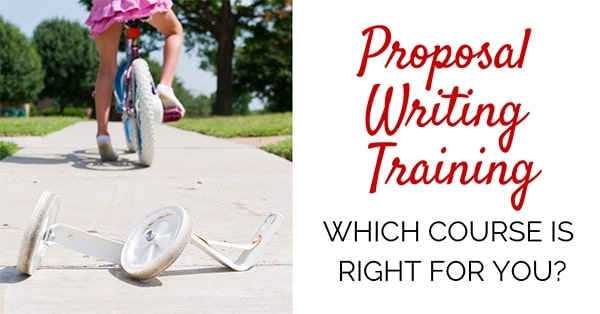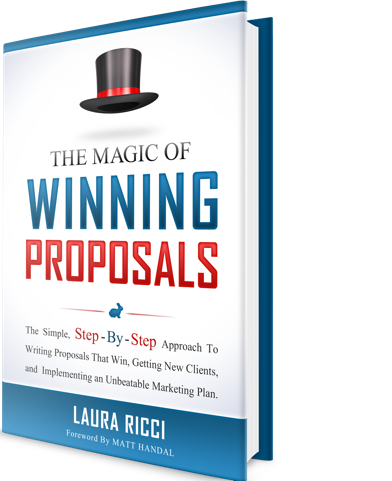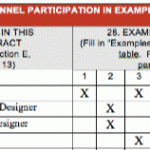
So you need to write your first proposal or learn to write better proposals. And now you’re looking for proposal writing training. Don’t worry, this post will give you everything you need to determine which training option is best for you.
But first, there’s something you need to understand.
Nobody Is Born A Great Proposal Writer
Regardless of the type of proposal you’ll be writing, you need to understand that nobody is born a great proposal writer. Proposal writing is a practice. It’s a skill that you’ll develop and nurture over time.
If you ever meet someone who claims to be a natural proposal writer, there is one of two things going on. Either they are lying or they don’t realize how bad they are.
I’ve been writing proposals for almost 20 years and I’ve submitted over 1,000 proposals. I can tell you I’m still learning.
Continuous learning and training is the cornerstone of any proposal writing practice. But what that training looks like is going to depend on which type of proposal you’ll be writing.
Which Type Of Proposal Are You Writing?
As someone who is passionate and has published a lot about proposal writing, I get people from all over the world emailing me. I’ve had to turn down a lot of people asking me for wedding advice or advice on how to convince the Governor to buy someone’s nephew a car.
You see, my area of expertise is helping people write proposals to win business contracts. But there are other types of proposals out there.
The type of training you need will depend on the type of proposal you intend to write. There are four types of proposals people write and they couldn’t be more different.
Business Proposals
People looking for business proposal writing training often work with a firm that is seeking to win a contract to perform services.
Grant Proposals
If you are looking for funding from an organization or government, you’ll be writing a grant proposal. Writing a proposal for a grant is different than writing a proposal for a service contract.
Education Proposals
If you’re writing a proposal to get your school to accept your thesis, that’s completely different than writing a grant or business proposal.
Marriage Proposal
Of course, there are people looking to get down on one knee and propose to their future spouse. Frankly, you don’t need any training for this. And if you are on Google searching for what to say in a marriage proposal…maybe you haven’t chosen the right partner.
For those first three proposals, my advice is to seek out training that’s laser-focused on the type of proposal you will be writing. And make sure the instructor has success writing proposals of that type.
Also keep in mind there may be terminology differences within each of these types. For example, outside the United States a proposal to provide services is called a tender.
The Different Types of Proposal Writing Training
Once you’ve determined which type of proposal you’ll be writing and identified a few training options that correspond with that, you need to determine the training delivery that’s best for you.
In-Person Training
The most common form of training delivery you’ll find is the one or more day in-person seminar. A one-hour webinar or seminar will likely not be able to deliver the depth of training you’ll need. That’s why single-day or multi-day seminars are common.
The biggest challenge with in-person training is that once you walk out of that door, you no longer have access to that training. And in even a day, you’ll cover a lot of information. You may walk away with a handout. But ultimately, the end product is whatever insight you retain in your memory.
And if you’re anything like me, you don’t remember as much as you used to.
In addition, once you take into account travel and registration costs, in-person training can be far more expensive than it first appears.
Further, due to the costs of putting on in-person seminars, it’s difficult for instructors to offer you a money-back guarantee.
On a more positive note, you may experience a greater level of personal interaction with the instructor during in-person seminars. Also, you’ll meet other people who write proposals.
I’m not saying to avoid this type of training. I attended Nancy Usrey’s day-long training on writing SF330 proposals many years ago. And I would do it again.
Online Training
Then there is online training. Online training can have advantages over in-person training if done right. In fact, all the courses I take these days are online.
I even developed my Win Writing and Proposal Management Mastery Programs as online alternatives that don’t include the inherent problems I saw with in-person proposal training seminars.
The drawback of online training is there are hucksters out there who will develop and sell a course to make a quick buck. So, you’ll have to do more homework before you select an online training course.
When considering online training, you should look for these things:
1. An instructor with proven success with the type of proposals you write.
2. A comprehensive program that covers what you need (which we’ll get to)
3. Lifetime access to all materials
4. A solid money-back guarantee
Proposal Writing Certification
Another form of training is a long-term certification process.
There are only two proposal writing certifications that I’m aware of. The first is through my Win Writing course. The second, and most common proposal writing certification is through the Association of Proposal Management Professionals (APMP).
APMP’s certification requires membership and jumping through certain hoops before you are eligible. But if you are pursuing a career path in proposals, it is probably worth checking out.
APMP’s certification is based on materials developed by Shipley, the consulting firm that founded APMP.
Shipley’s proposal process is seen by some as overly complex. But there are certainly people out there who have experienced great success using their process.
Proposal Writing Books
Reading the right book might be all the training you’ll need. So don’t knock books as one of the options you should consider. Often, books on proposal writing cover as much, if not more, than training courses.
The proposal writing book I often recommend is The Magic Of Winning Proposals by Laura Ricci. Laura, who is now retired, used it as a proposal writing training manual for her clients. It’s the perfect book for anyone writing a business-related proposal.

But there may be other books that focus directly on the type of proposal you are writing. Just make sure you read the table of contents and reviews before selecting the right book for you.
Proposal Writing Vs. Proposal Management
The training you receive should also correspond with what part of the proposal development process you’ll be involved in.
Let me give you an example. Developing proposals can be a team effort. One of the biggest frustrations of people who work with proposals is not receiving information from their teammates in a timely manner.
That’s a proposal management issue that requires training in proposal management, not writing.
If you need training in proposal management, don’t accept training that does not focus directly on that topic. Many proposal writing courses touch on management topics. But in my opinion, they don’t do an adequate job of giving people the proposal management strategies and skills they need.
Again, you need to consider the type of proposal first. You may be working on a proposal effort that requires no management whatsoever. In those cases, proposal management training would be a waste.
What To Look For In A Proposal Writing Training Course Outline
Unfortunately, proposal writing training courses rarely provide you with samples of the course. But they often provide you with a course outline or syllabus before you purchase.
Make sure you thoroughly review the course outline (i.e. the topics that will be addressed in the course). Again, make sure the topics match up to what you need to learn.
At the very least any proposal writing course should touch on these topics.
The typical proposal writing training course outline will likely address these topics:
- Getting selection committees or decision makers to choose your proposal
- Gathering information about what the decision makers really want
- Planning out the proposal effort
- Writing the different sections of the proposal
Those elements are pretty standard among different proposal types. Understanding what the decision makers want and how they decide is critical whether it’s a business, grant, or education proposal.
But remember, any training option you pick MUST be tailored to the type of proposal you are writing. So, you’ll need additional topics covered that are relevant to your proposal type.
Here’s the course outline for my Win Writing program, which is focused on writing proposals for service contracts:
How Top Firms Use Proposal Writing To Generate Millions Of Dollars
- What Better Proposal Writing Can Do For Your Business
- Proposal Writing Mindsets: Why The Top Proposal Writers Think This Way
- How To Track Your Proposal Efforts The Right Way
The Unspoken Psychology Of Proposal Selection
- The Prediction Machine: The Unspoken Truth About Emotions And Client Decisions (It’s Not What You Think)
- Fixed Action Patterns: The Security Flaw In Our Decision-Making Process
- The Six Scientifically Proven Weapons Of Influence You Can Use To Get Your Clients To Say Yes — Ignore These At Your Own Risk
Securing The Advantage
- How To Read Your Client’s Mind (Even If You’ve Never Met Them Before)
- How To Get Meetings With The Unreachable: The Actual Word-For-Word Scripts I Use To Get Meetings With Extremely Busy People
- Client Capture Scripts: The Exact Questions I Ask Clients To Find Out What They Really Want
Foolproof Planning
- Go/No Go: How To Determine What To Go After (And What To Pass On)
- RFP Translation: Decipher The Key Points You Really Need To Address For The RFP Or RFQ
- Planning for Success: Never Stress Over A Deadline Again
Better…Faster…Stronger Proposal Writing
- Proposal Math: What Do Clients Actually Do With Your Proposal?
- The Hollywood Playbook: How To Drastically Speed Up Proposal Writing
- The Pareto Writing Rules: 5 Simple Rules That Supercharge Readability (The Only Ones You’ll Ever Need)
- Narratives: How To Build Resumes And Project Descriptions That Sell
- The Four-Step Cover Letter: The Exact Formula I Use To Write Cover Letters That Set You Apart
- How To Write A Technical Approach (Even If You Have No Technical Expertise)
Notice how specific that outline is to writing service proposals. This course would be overkill for anyone writing a thesis or grant proposal. But for business proposals, it hits all the bases.
The Bottom Line
I know we covered a lot in this post, so here are some simple questions to determine which course is right for you.
- Which type of proposal am I writing?
- Which training delivery method works best for my learning style
- Which parts of the proposal development process (writing or management) will I be involved in?
- Do I need a certification?
Answering these questions will ensure you select the best proposal writing training for your specific needs.





Speak Your Mind